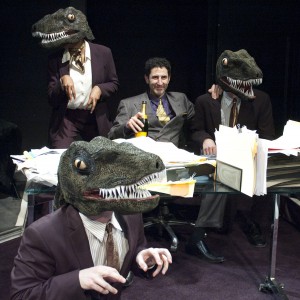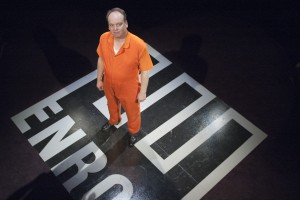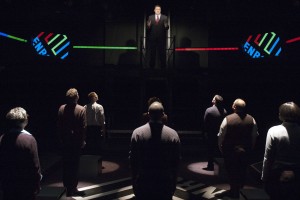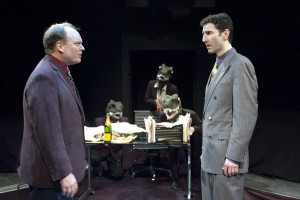A CRIMINAL SCRIPT OF AN EVIL STORY
Lucy Prebble’s play Enron tries to dramatize the Enron financial scandal, one which serves as a poster child for everything greedy and immoral and corrupt in the American financial system. The play was a big hit in London, but the Broadway outing died after a few performances. Interestingly, Michael Billington, The Guardian’s critic since 1971, blamed the Broadway demise on what he called Ben Brantley’s “harsh” New York Times review.
Maybe the British enjoyed the on-stage portrait of corporate malfeasance that made America look so bad. Maybe the London production was better than the Broadway version. Based on the production at the TimeLine Theatre, I’ve got to side with the dismissive American audience reaction. In spite of TimeLine’s typically resourceful staging, Enron is not a satisfying play.
 Granted, the subject matter does not lend itself to dramatization – all that accounting chicanery and smoke-and-mirrors balance sheet manipulation gets pretty rarefied for an audience that probably has its hands full balancing the family checkbook every month. Prebble does a decent job of laying out the intricacies of the Enron rise and fall so the attentive spectator can grasp the main fiscal issue, but the allegorical nature of the play detracts from the storytelling.
Granted, the subject matter does not lend itself to dramatization – all that accounting chicanery and smoke-and-mirrors balance sheet manipulation gets pretty rarefied for an audience that probably has its hands full balancing the family checkbook every month. Prebble does a decent job of laying out the intricacies of the Enron rise and fall so the attentive spectator can grasp the main fiscal issue, but the allegorical nature of the play detracts from the storytelling.
The script rightly concentrates on the chief real-life personalities in the scandal, notably Enron president Kenneth Lay, CEO Jeffrey Skilling, and chief financial officer Andrew Fastow. A fourth person, and the only major female character, is Claudia Roe, evidently a blend of a couple of actual women high up in the Enron power pyramid. Kenneth Lay isn’t developed very well in the play and Claudia is a fifth wheel. She has a few scenes with bite, but if the woman was omitted entirely from the story, the narrative would not have suffered.
The play really belongs to Jeffrey Skilling, strongly performed by Bret Tuomi, who portrays the CEO as an overbearing bully in love with himself as a visionary. It is Skilling’s vision that sends the company skyrocketing into the international corporate firmament – that is, before it plummeted back to earth when the Enron balance sheet was exposed as a sham concealing billions of dollars in debt. Skilling was sentenced to 24 years and 4 months in prison for his role in the Enron calamity, but he always proclaimed his innocence and is appealing his conviction to this day.
The Jeffrey Skilling in Prebble’s play is more of a tragic figure than villain, a man carried away by his belief in his own brilliance. (Until, of course, Enron spun out of control, putting thousands of people out of work while executives sold millions of dollars’ worth of stock.) The Skilling on stage may be distasteful and take the Darwinian dogma of the survival of the fittest to the extreme, but he isn’t really presented as a criminal. His corporate reach basically exceeded his grasp. For me, Enron applied a coat of whitewash to Skilling’s Enron career that I found troublesome.
 Andrew Fastow is the most complex character in the play, a young accounting genius who manufactures the complex financial gimmicks that precipitate the company’s fall. As superbly played by Sean Fortunato, Fastow is an eager and ambitious man who finds a mentor in Skilling. If Skilling is the major malefactor in the Enron disaster, Fastow is the major facilitator.
Andrew Fastow is the most complex character in the play, a young accounting genius who manufactures the complex financial gimmicks that precipitate the company’s fall. As superbly played by Sean Fortunato, Fastow is an eager and ambitious man who finds a mentor in Skilling. If Skilling is the major malefactor in the Enron disaster, Fastow is the major facilitator.
The play does suggest the combination of naiveté and complicity among the U.S. government, the financial press, the Arthur Anderson accounting firm, and the Lehman Brothers brokerage house – all of them helped to enable Enron’s rapid rise, even with its shaky financial underpinnings. Prebble injects vaudeville-like bits to dramatize Enron’s ascent and decline: a ventriloquist, a song-and-dance act, two Lehman Brothers occupying the same suit, and performers wearing the heads of both dinosaurs and three blind mice (costumes by Elizabeth Flauto). Possibly the playwright felt her script needing a little lightening up, lest the weight of the financial discussions grow too ponderous, but I found these interludes distracting and trivializing.
Rachel Rockwell steps aside from her status as the hottest musical theater director in the area to direct this play (Jesse Klug and Greg Hofmann designed the lighting, Kevin O’Connor the sound and Mike Tutaj the film and video projections). Rockwell’s staging moves briskly on Kevin Depinet and Nick Sieben’s set, and the arcane subject matter comes across lucidly – frequently with high tension and sometimes with comedy. But there is slackness in the script that her directing cannot overcome. The play starts slowly, and spectators unfamiliar with the Enron story may spend the first 20 minutes wondering where the play is going. The storyline is hurt by the weakly drawn character of Kenneth Lay (admirably played by Terry Hamilton) and the failure to integrate Claudia into the crux of the plot (Amy Matheny plays the executive with a ferocity required for a female to survive in the macho Enron boardrooms).
Caryl Churchill, another contemporary British dramatist, wrote a play called Serious Money that displayed the greed, materialism, and cynicism of the financial world in the United Kingdom with more edge and insight than nearly anything in Prebble’s play, which could use the explorations of the no-holds-barred motivations that illuminated the Churchill play. Skilling and his colleagues were terrible people who caused flagrant damage to this country through their relentless determination to make money (and more money) by any nefarious means. Enron needs to cut deeper and be angrier. The superb presentation of the Enron saga in the TimeLine lobby was more engrossing, edifying, and disturbing than most of what occurred on the stage.
photos by Lara Goetsch
Enron
TimeLine Theatre
ends on April 15, 2012
for tickets, visit TimeLine
for more shows, visit Theatre in Chicago



